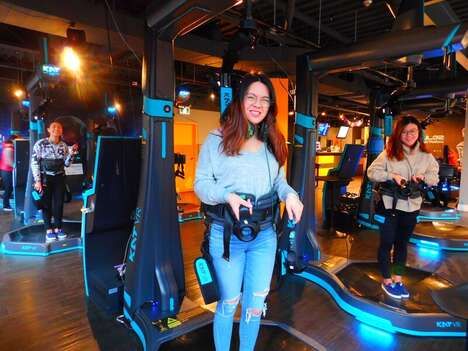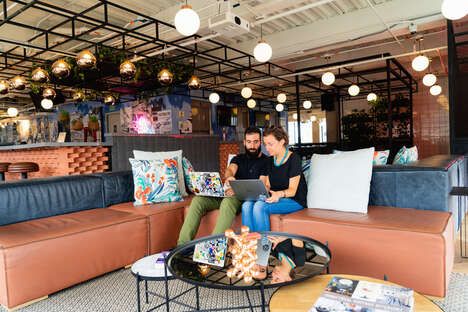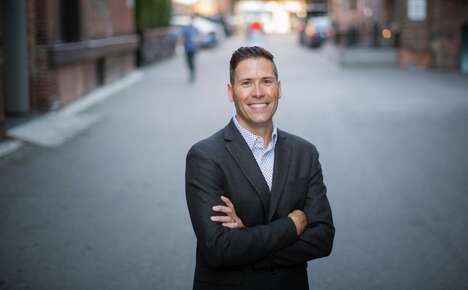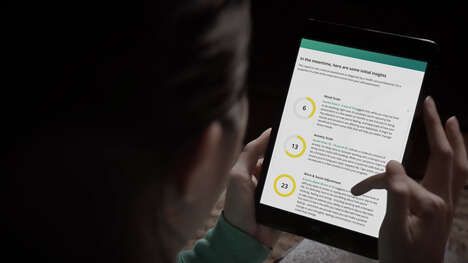Learning Skills for Employability
An Interview with Jennifer Flanagan, CEO of Actua (VIDEO)
play_circle

Actua is a Canadian company that is attempting to give individuals peace of mind. As the largest STEM youth outreach network in the country, it seeks to inspire children to become young innovators and build the skills that they will need to work alongside technology. With a focus on diversity, Actua has a rich network that amplifies the national voice for youth in STEM through various programs—from camps and workshops to year-round after-school clubs. Trend Hunter spoke to Actua’s CEO, Jennifer Flanagan, about the future of work, how technology has and will impact it, as well as the work that the organization is doing to rebalance employability.
How has technology affected the contemporary workspace? Can you speak about the positive and negative aspects of it?
Technology transformed everything at an almost instantaneous pace. It completely reimagined how most of us work on a day-to-day basis—from how to where to what. Actua is an organization that is in a really unique place as we are not only dealing with these changes, but we are also strategizing on how to prepare others for the future.
We certainly think that technology has created a huge amount of economic value—in terms of boosting efficiency, productivity and communication levels—but we are also very concerned about the social implications that are created. From the workplace perspective, we see this social impact daily. Employees are better connected and can collaborate through tech. The quality and efficiency of my work, for example, benefits from video conferences that connect me to different people across the country. Of course, now, people can also work anywhere and anytime—this constitutes a major shift.
There are all sorts of positive aspects in the way technology helps us in our careers, but there are negative connotations, as well. For example, it is easy to fall into the cycle of working all the time. People have begun to seamlessly pass between their professional and personal lives and this is where productivity can be negatively impacted. And it works both ways—for example, if you are having employees spend long times on social media or people who are overworking themselves.
In terms of gender equity, technology has also given us a leg up. From a global perspective, tech is an unbelievable equalizer as more women can access education and learning opportunities wherever they are. A few years ago, this would have been impossible for many due to their geographical position, cultural norms or personal circumstance.
From the point of recruiting, the process has gone in creative directions. Blind hiring is one of them and this is selecting people without knowing their gender. There are also hiring algorithms that identify candidates beyond traditional mechanisms. The data shows that when these algorithms are accurate, women and men are selected in equal numbers as qualified candidates. There is, of course, a downside because some of the artificial intelligence algorithms have a gender bias. This stems from the fact that most of the tech is still developed and driven by men. It is tricky, but we have to pay really close attention to the data and AI side of things. As of right now, the technology sector is made up of less than 20% of women and less than 10% of them are in executive positions. Therefore, digital literacy is incredibly critical for young women and others around them. This is where Actua comes in—we know that without digital literacy, there will continue to be underemployment of women in STEM-related fields.
Finally, from a social perspective, tech provides a global platform to share and understand critically important data and to amplify the voices of men and women who are working toward gender equity. Movements like #MeToo are driven by social media platforms and other technology that enables the message to go far and wide to create an impact.
What is the impact of mixed-reality (VR and AR), as well as AI in this space?
We try to talk to kids about this impact all the time. We focus on their understanding of the basics of VR and AR, we ask them how they think these technologies will be useful to healthcare or sustainability. This is a tactic that prepares them for the future because these changes are happening really fast. We know that tech will dramatically disrupt and transform sectors in ways that we can’t even imagine yet. It is less about how it has transformed the workspace already and more about making sure we are prepared for when more change happens.
A big part of this is also managing the anxiety that exists among a lot of people. In my world with Actua, there are thousands of parents who are concerned about automation and what that could mean about the future of jobs. They are wondering how they can prepare their kids for this and they don’t even know what the outlook is. We need to get people less worried about automation and to get them thinking about how this automation is going to augment work and various industries. Since tech like AI is going to impact all industries, we need to have the skills to actually work alongside this technology—how do we employ our human skills, the ones that are impossible to replicate, and use the available technologies to solve some of the global problems that we haven’t been able to tackle. That is rather exciting and youth is actually really attuned to this because they have the intuition to blur those lines between human-based skills and tech.
What are the most important skills to have in the present/future?
The ability to understand how technology can augment our work is very important. This needs to be combined with digital literacy. These skills are absolutely critical and within themselves, they also include things like complex problem-solving and collaboration across teams. We already know what the major downside of technology is—the isolation and lack of human contact. I think there is going to be a little bit of a rebalance here, where people come to the realization that those face-to-face interactions are still very important.
Another skill that I would like to emphasize is the openness to learning. You can prepare for a career six months from now, but in that environment, you will have to have the skill to adapt to new forms of technology and educate yourself along the way.
The last skill I will call attention to is empathy and we are stressing this topic a lot at Actua because we are teaching STEM in a way that focuses on inclusivity on all accounts as one needs to understand the end-user and be responsive to needs.
What do you think of coding/STEM toys for kids? Why are they here and will they make a difference?
Actua puts out a list of STEM toys for kids every year and what I like about these products is that they promote skill-development in little ones, while also being fun. In this case, playtime is a great way to prepare and learn for employability in the future. I mentioned before—problem-solving, collaboration, openness to learning—these can all be stimulated through playtime. STEM toys also respond to the huge concern about ‘screen time.’ It is important to note, however, that not all ‘screen time’ is equal and that there are productive ways for use of technology that can help kids get a head start, whether that is in the space of math, reading, writing and so on.
This also reassures parents that their kids aren’t just mindlessly consuming, but that they are learning at the same time. The toys that Actua recommends are obvious educational tools. There is this amazing smart globe, for example, that uses augmented reality to engage kids and relate information about all kinds of areas around the world. If children turn to Canada and the Arctic, they will learn about animals, food, and culture. It works with a smartphone or a tablet and it is really fun. This is what it all comes too—using technology not as a means to consume, but in as a way to create. There is a difference between a user of technology and those who are technically proficient, and this is an important distinction.
How does Actua fit into this environment?
Actua is building the pipeline for youth to develop their skills and confidence, specifically in science and technology. What we teach can also be deployed in other careers, as well. It is way easier to build these critical employment skills at a very young age; one shouldn’t wait until university to develop them. We have these types of conversations with kids—about their strengths, skills—and at the same time, we expose them to cool technologies, tools, and science-based topics. Our role is to make sure that they are supported throughout the learning journey.
We work specifically with groups who are underserved and underrepresented in STEM. This is in part driven by social justice and equity, but also because we are aware that we will not achieve the full potential of tech and science if we don’t look at it from a diverse perspective. The space that Actua is creating is not only in favor of the inclusive tech sector but also for the benefit of the future workforce.
How do you think technology will impact the workplace in the next 10 years?
I think we will still see a continuation of this rapid influx of technology that necessitates change. We know that a lot of things will be automated—hence, the need for re-skilling and understanding of how jobs are transforming. I think there will also be rebalancing as people understand the negatives of this ‘always-on’ culture, which is surely detrimental to employee wellbeing, both mentally and physically. Corporations are already catching wind of this and taking measures, whether it is though tech detoxes, mindful workshops or something else.
I am optimistic about how people are going to eventually embrace this potential of augmentation fully and for them to start focusing on areas that they are really talented in, while leaving the repetitious work to technology. My hope is also that this will happen in inclusive ways.
Featured Articles

Hazardous Training VR Experiences
VRulez Allows Trainees to Safely Gain Hands-On Experience

The Importance of Design-Thinking
An Interview with Kevin Morris, OCAD U CO's Managing Director

Revamping Traditional Retail
Grafton Apparel CEO Lance Itkoff Explains Tip Top's Recent Evolution

Innovating with the Future
Ford's Futurist, Sheryl Connelly Discusses Implementing Positive Change

Mapping the Future of Work
An Interview with Cheryl Cran, Founder of Consultation Firm NextMapping

The Allure of Life Sabbaticals
An Interview with Remote Year Founder and CEO, Greg Caplan

Branding Global Employee Narratives
Ben Clark Details Heineken's Go Places 2.0 Campaign

The Coworking Revolution
CEO Wayne Berger Speaks to the Demand for Flexible Working Environments

Entering Digital-First Therapy
An Interview with BEACON Founder, Sam Duboc